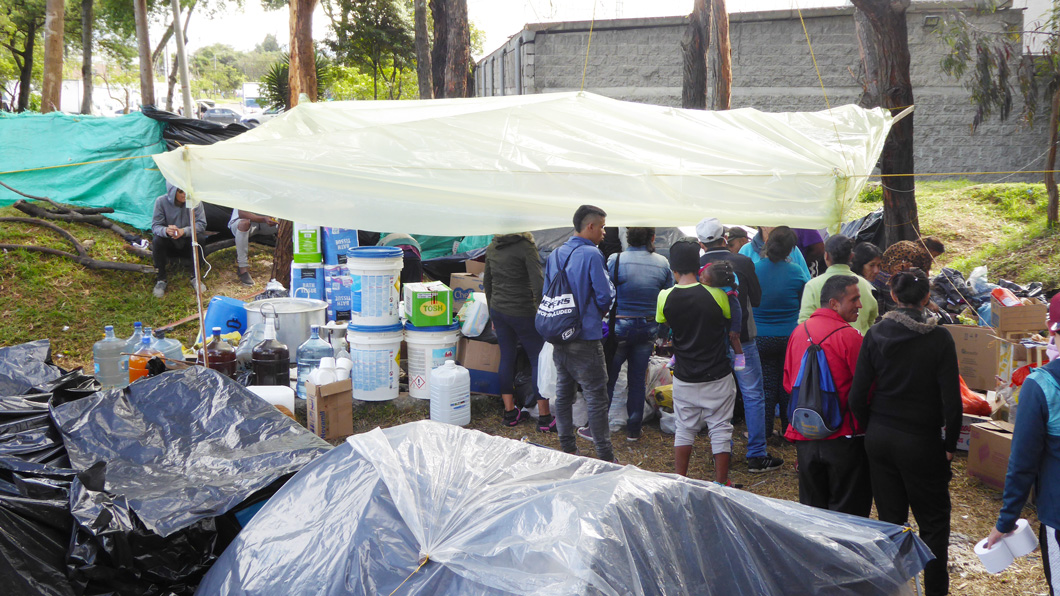
The communal kitchen at the camp in Salitre
Venezuela’s collapse has sparked a trail of human misery which is not going to end any time soon.
“Trying to buy toilet paper in Venezuela? It’s cheaper to use these,” says the news reporter waving a wad of devalued Bolivar banknotes. Ultimately it is irrelevant whether they are the old ‘strong’ bolivars, newish ‘sovereign’ notes (with several zeros lopped off) or some other new-fangled currency. With inflation approaching one million per cent, by the time you’ve got the stuff to spend, even if you could find a toilet roll in the empty supermarkets, it would still be better to use the banknote – if only for the satisfaction of shoving some politician’s face where the sun doesn’t shine.
Of course, faced with such dilemmas, as well as hunger, malnutrition, disease, spiralling state and criminal violence, loss of livelihoods and seeing their life savings evaporate in one chest-puff of their dear leader, most Venezuelans would elect change. But that boat sailed long ago. With extreme poverty, resistance has dwindled. The opposition – like everyone else – is reduced to barely getting by. Now people are voting with their feet and leaving the country.
Los caminantes
The land border is open and ever more Venezuelans are walking into Colombia. Thus we’ve had the shocking scenes on local and international news of los caminantes, groups of desperate travellers tramping across Colombia’s cold mountains. With good reason the TV newscasters are quoting Homer, the Old Testament and the ghost of Steinbeck’s Tom Joad.
And it’s happening on a street near you. I don’t have to stroll more than 50 metres from my front door to encounter a ragged, thin, but cheerful group of bróders trying to clean windscreens at the junctions.
If you live here, you’ll have noticed the vast number of Venezuelans doing casual work in cafes, car washes, hairdressers and the like. Others have created their own successful businesses and within a block of me you can find a restaurant, a music recording studio and a health spa all owned and staffed by longer-term migrants.
While many of the new arrivals are grateful for the help they have received en route, longer-termers are not so upbeat. A friend of mine tells me there is a “creeping xenophobia” here. She is plugged into a vast social media web of Venezuelans in and out of Colombia, still back home or in Ecuador and beyond. The crisis has created solidarity between past and recent migrants.
Read our full coverage of the Venezuelan migrant crisisThis is how you can help: Several organisations can do something with your help.From riches to rags: What happened in Venezuela and why are people leaving?Interviews with Venezuelans #1: ‘We left because there was no food.’Interviews with Venezuelans #2: ‘I had to leave because I denounced the corruption.’Compassion and condemnation: The struggle for acceptance in a crowded capital.Crisis is just beginning: NGOs raise alarm over situation for fleeing Venezuelans. |
It‘s this self-help network, and agility in finding jobs – often by undercutting salaries, with rolo employers happy to pay less – which puts the Venezuelans on a collision course with the existing low-paid workforce already struggling to exist in Bogotá.
“Why do we help them when so many people in Colombia need help. Are we mad?” says another friend. True, many people here live close to the breadline and Colombia has the third highest internal displacement in the world. But another amigo quashes the argument: “We have something. They’ve got nothing. Colombia’s on the up. Venezuela’s going down.” That nails it.
Until now, Colombia, which has borne the brunt of the migrant crisis, seems remarkably tolerant of the influx. This could be because for many decades Colombian migrants – many fleeing conflict and persecution in Colombia – were generously received in Venezuela. In fact, many returning ‘Venezuelans’ are dual nationals or Colombians who migrated there over many decades.
But it’s also because Colombia’s political leaders have – at least until now – manifested compassion. Some of this is genuine, I am sure, but it is also down to some schadenfreude at watching Venezuela’s loudmouth president drive his revolución bolivariana bus over a cliff.
Goodwill has an end-date
This goodwill though – just as it did towards Syrians in Europe – has an expiry date. Some of the roadside assistance given to Venezuelans is based on the fact most have been moving on to the countries further south. But from now on more will stay on in Colombia. And it’s only a matter of time before populist Colombian politicos beat the drums of xenophobia.
You might think that given the depth of the crisis in Venezuela, the regime’s days would be numbered. Maybe they are. But some analysts are describing the crisis as “politically convenient” for Maduro. The unbearable economic climate has driven out the opposition. Ongoing chaos maintains the military crackdown. Hunger controls a pliant population. The ruling party will hunker down until oil prices rise and production gets back on track (it’s currently 50% of the 2015 level). Petrodollars might yet save the regime.
But not the Venezuelan people. Not even the most optimistic observer sees the migrant influx slowing down, and the Colombian government is itself predicting another million arriving in the next 12 months.
In this case the crisis isn’t ending. Or even beginning to end. It’s just beginning.
Gerald Barr





